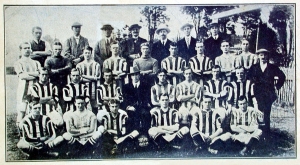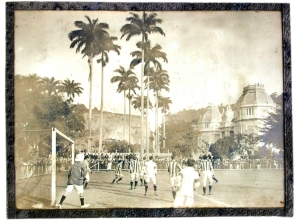The war to end all wars
Today is 99 years since the beginning of the First World War, and so it seems right to mention the connection between our project and one of the most important events of the twentieth century.
When war was declared, Exeter City had finished their tour of South America, and were on board the Alcantara on their way back to England. Due to the hostilities, the ship was fired upon twice as it approached British waters, but only by our own forces. While originally headed for Southampton, it was redirected to Liverpool once it entered the English Channel.
At the beginning of the conflict, several sportsmen, including footballers, were called up to join the forces as they were also members of the army reserves or territorials. However for most, the belief that the war would be ‘over by Christmas’, allowed them to go about their daily lives, starting pre-season training and starting the 1914/15 season as usual. However as the conflict continued with huge casualties, footballers and their supporters came under more and more criticism for not joining up. The FA offered full cooperation to the War Office, and over the season more and more measures came into place allowing the world of football to support the war effort – footballers began military training on weekdays before travelling to matches at weekends, grounds were made available for use by the War Office and money was raised at games to support relief funds. By the end of the season however, football was in crisis and many players had joined up. League games were then cancelled until after the war.
While it has been reported that Exeter City player Gus Harding died in the war, this is actually not true. Of the players who went on the South American tour, it seems all survived the conflict, although Fred Marshall and Billy Goodwin never played again due to the injuries they had sustained. Despite the criticism that footballers received for not joining-up early in the conflict, they had much more at stake than many other professionals. While an injured office clerk could return to work after the war, an injury for a footballer meant retirement.
If you’re interested in more information about footballers and the First World War, a book by Andrew Riddoch and John Kemp “When the Whistle Blows” has been very useful for my contextual research. It mentions Exeter City’s Fred Goodwin and Fred Whittaker, who joined the 17th Middlesex or the ‘Footballers Battalion’.


